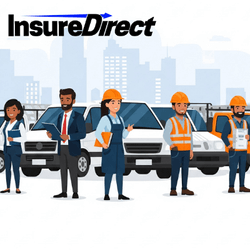Running a business with vehicles isn’t just about moving stuff or people—it’s juggling rolling assets with a side of potential chaos. Cars, vans, trucks—they’re tools, investments, sometimes even ticking liabilities. Without proper coverage, a fender bender can snowball into lawsuits, repair bills, or worse. I’ve seen it. It’s messy.
What Exactly is Commercial Auto Insurance?
Commercial auto insurance is a policy designed specifically for vehicles used in business operations. Not your typical personal car insurance. This type of coverage considers the unique risks businesses face: transporting goods, hauling equipment, or driving clients. It’s like a protective shield for your wheels, employees, and finances all at once.
Whether you’re rolling with a single company car or a fleet of trucks, commercial auto insurance covers:
Accidents and collisions (minor and major)
Damage to property, other vehicles, or buildings
Liability claims when a person is hurt or property is damaged
Medical payments to drivers, passengers, or injured third parties
Uninsured/underinsured motorists
Theft, vandalism, fire, or natural disasters
It really guards against a car accident shutting down your entire business.
Why Your Business Needs It
1. Personal Policies Aren’t Enough
Many business owners assume their personal car insurance will cover business driving. Usually, it doesn’t. Delivering goods, visiting clients, or hauling equipment? Personal policies often deny these claims, leaving you paying out of pocket.
2. Increased Exposure to Risk
Business vehicles log more miles, haul expensive equipment, or transport passengers. Higher exposure means more chances for accidents. Without insurance, even a single mistake can cost thousands—or tens of thousands—in repairs, legal fees, or medical costs.
3. Legal Requirements
Commercial auto insurance is mandatory in most states if your business owns, rents, or operates vehicles. Skipping coverage could result in fines, suspended licenses, or even court-ordered business shutdowns. Compliance is non-negotiable.
Key Types of Coverage
Commercial auto insurance can be tailored to your needs. Common components include:
Liability Coverage: Insures injuries and property damage caused by your driver or vehicle. Usually required by law.
Collision Coverage: Covers damage to your vehicle in an accident, regardless of fault.
Comprehensive Coverage: Protection against theft, fire, vandalism, storms, or accidents involving animals.
Medical Payments Coverage: Covers medical bills for drivers or passengers, regardless of fault.
Uninsured/Underinsured Motorist Coverage: Protects you if the at-fault driver lacks insurance.
Hired and Non-Owned Auto Coverage: Extends to rented vehicles or employee-owned vehicles used for business purposes.
Who Actually Needs This Insurance?
Commercial auto insurance isn’t just for trucking companies. You may require it if your business:
Transports equipment, tools, or merchandise
Drives customers or employees
Visits job sites
Leases or rents vehicles
Employs drivers using company-owned vehicles
Industries that commonly require coverage include construction, delivery, real estate, catering, sales, and field services.
What Affects Your Premiums
Insurance costs depend on several factors:
Number and type of vehicles in your fleet
Driving record of employees
Type and amount of business risk
Coverage limits and deductibles
Location and miles driven annually
Small businesses typically pay $600–$2,500 per vehicle per year, but costs vary based on risk.
Tips to Save on Premiums
Bundle Policies: Combine auto insurance with general liability or property insurance for discounts.
Increase Deductibles: Choose a deductible within your budget to lower monthly premiums.
Maintain Clean Driving Records: Training and safety programs reduce accident likelihood.
Install GPS/Telematics: Fleet tracking technology may reduce premiums.
Annual Policy Review: Update your coverage as your business grows to avoid gaps—but don’t over-insure.
Selecting the Right Policy
Assess Your Needs: Consider vehicle types, driver experience, cargo, and routes.
Work With an Experienced Agent: Commercial insurance can be complex; experts prevent gaps.
Compare Rates: Find competitive premiums without sacrificing protection.
Review the Fine Print: Understand exclusions, claims procedures, and limits.
Additional Business Vehicle Protection Tips
Cargo Coverage: Protect tools, equipment, and merchandise.
Emergency Kits: Prepared vehicles reduce accident severity.
Accident Reporting: Promptly report incidents to avoid claim denial.
Driver Safety Programs: Continuous training lowers premiums and risk.
State Compliance: Laws change; keep your coverage current.
Final Thoughts
Vehicles are essential assets for many businesses. Commercial auto insurance is not optional—it’s an umbrella that:
Protects finances from unexpected costs
Ensures legal compliance
Safeguards employees and passengers
Maintains reputation and client trust
A single accident could financially ruin a business. Don’t gamble—invest in comprehensive coverage to keep operations running smoothly.
Contact InsureDirect
For reliable commercial auto insurance and expert guidance:
InsureDirect.com
Corporate Home Office
618 South Broad Street
Lansdale, Pennsylvania 19446
Email: contact@insuredirect.com
Phone: (800) 807-0762 ext. 602
Keep your business, vehicles, and home fully protected with InsureDirect—because your assets deserve nothing less than the best.

